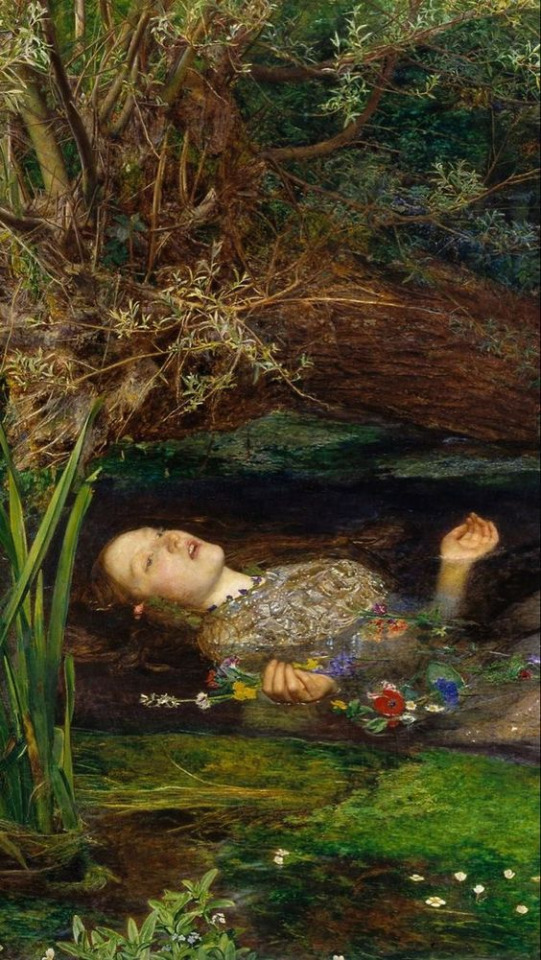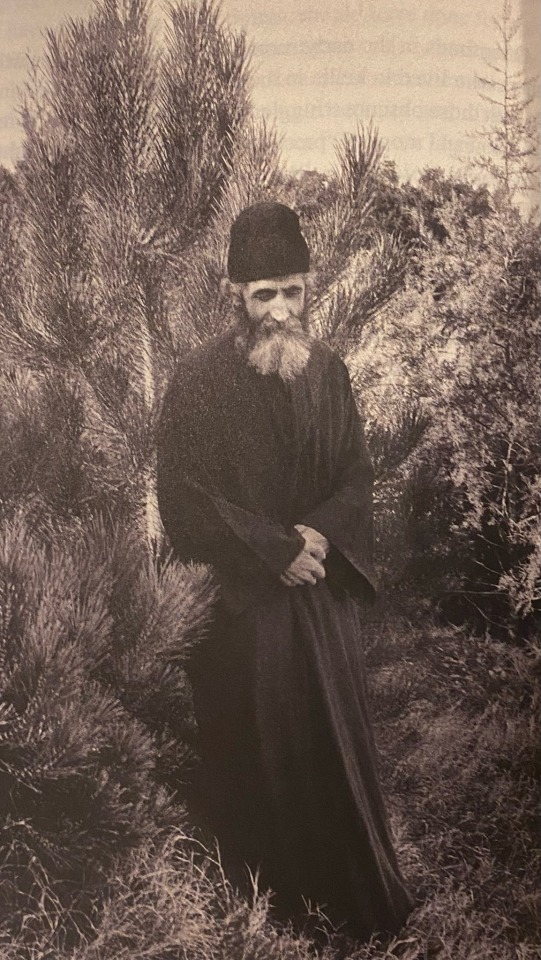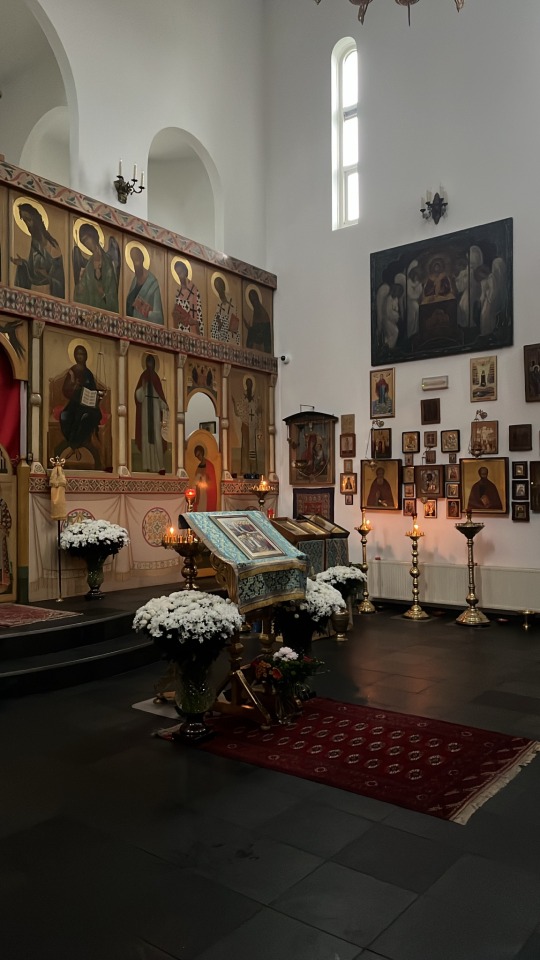#Orthodox Christian theology
Text
Mother Mary - The Veil of the Holy Spirit
In the name of God the Father, Christ Jesus His Son and the Holy Spirit, One True God. Amen.
Dear brothers and sisters in Christ Jesus
On the 15th of August, many Orthodox Churches around the world celebrate the Feast of the Assumption of Mother Mary. Apart from the various feasts which celebrate the life and ministry of our Lord and Saviour Jesus Christ, the feast of the Assumption of Mother…

View On WordPress
#Divine presence in Orthodox Christianity#featured#Holy Eucharist symbolism#Holy Spirit&039;s role in salvation#Mary as the Cover of the Holy Spirit#Mary&039;s obedience and humility#Orthodox Christian theology#Orthodox faith#Orthodox iconography#Orthodox liturgical practices#Theological understanding of Mary#Theotokos#Theotokos significance
1 note
·
View note
Text

gorgeous prayer candle by FannyPippin on Etsy
#christian blog#christianity#spirituality#theology#catholic#christian faith#catholiscism#prayer#candles#catholic aesthetic#catholic saints#mother mary#virgin mary#devotional#christian witch#christopagan#christian mysticism#orthodox christianity
406 notes
·
View notes
Text

“Everything will be very simple and easy if you decide to do it unto God, for God’s sake, and to the glory of God. Everything in life and in the soul will immediately come together.”
-Father Ioann Krestiankin.
#history#books#religion#literature#theology#esotericism#mysticism#orthodox#religious#christian#orthodox christian#orthodox christianity#orthodox church#church#russian orthodox#byzantium#church of Moscow#church of Constantinople#christian aesthetic#christendom#christianity
336 notes
·
View notes
Text
My Biggest Objection To Calvinism
I think that Calvinism is, if taken to its logical conclusion, a nihilist theology.
Calvinists affirm, as per Westminster Catechism 1, that the purpose of human existence is the glorification of God. Furthermore, the standard Calvinist theodicy states that evil is permitted in order to glorify God by Him punishing and destroying it - hence, damnation is glorifying to God, because He is punishing evil. Furthermore, it is as glorifying to God as salvation, because if it were not God would be limiting His glory (which makes no sense when God is absolutely sovereign and created the universe to glorify himself) or universalism is true (which any orthodox Calvinist would deny, and rightly so).
The conclusion, hence, is that the damnation of the reprobate and the salvation of the elect are equally glorifying to God, and hence, within the logic and value system of Calvinism, equally good - which, in my opinion, is a transparently nihilist stance. Why work for the salvation of others or devote oneself to the Christian life if damnation is equally good?
A Calvinist might object that systems that include free will also have this problem, since they too assert that God permits evil for His glory (so that people can be free and hence do meaningful good). However, such systems (at least Eastern Orthodoxy, the one I belong to), deny that damnation is glorifying to God, and state that the greater good comes from the fact that humans following God of their own volition and cooperating with Him is far more glorious than humans doing so because of compulsion.
A Calvinist might also object that I've cut the Westminster Catechism short; it says "to glorify God and enjoy Him forever" the latter of which people in Hell are obviously not doing; hence, damnation is worse than salvation. But that makes the problem worse, because if you say that enjoying God forever is one of the chief ends of man and there are many people who will not be enjoying God forever, you've conceded that it's possible for God's purposes to be thwarted - and once you concede that, the entire edifice of Calvinism is fatally compromised.
Any Calvinists here, I'd be interested to hear your thoughts. Tagging @greater-than-the-sword, @rabbits-of-negative-euphoria and @theexodvs for that purpose.
86 notes
·
View notes
Text
We see that it is not the task of Christianity to provide easy answers to every question, but to make us progressively aware of a mystery. God is not so much the object of our knowledge as the cause of our wonder.
-- Kallistos Ware, The Orthodox Way --
381 notes
·
View notes
Text
For people who had ‘problems’ with Christianity, and became an athiest or converted.
Now I’ve been an athiest at times, when I didn’t understand theology and the true aspects of the Bible. Though, Christ had led me back with even more knowledge and wisdom.
So, I’m not gonna gatekeep but I want to share some advice if you want to delve and understand Christianity more. Without cherrypicking bible verses out of context, and using it as baseless arguments. Also the fact most evangelicals/pastors can contort someone’s view of Christ and Christianity, and eventually mislead them.
Here are some recommendations for more understanding:
Learn about Christian apologetics and the community (mainly on Tiktok) —— (recs: OrthoTruth, Sam Shamoun, InspiringPhilosophy, Cliffe Knetchle.)
Theology, and the understandings of doctrines. Don’t always get your facts from randos online if they dont state any scholarly sources and such. Basics: Hypostatic Union, how the trinity/triune God works. (I’ll make a post about this)
Inner Peace, How to deal with sin, and the lovingness and faithfulness of Christianity (recs: Father Spyridon)
Read the Bible, and use BibleRef.com to answer any questions you have about verses
Scholarly Books to deepen understanding (I’ll also make a post about this!)
May God bless you wherever you are. True knowledge is beautiful, and can lead to innate spiritual fruition. This can secure your faith and you can also use it to secure others!
#a school of christ#christianity#jesus christ#jesus#christ#catholic#orthodox christianity#orthodox#evangelical#protestant#theology#bible#bible study#bible scripture#knowledge#wisdom#religion#religious beliefs
61 notes
·
View notes
Text
Suffering is not What You Think

(The Penitent Magdalene)
So often you hear, when people leave their churches, their gripes surround suffering. Why would God allow suffering? Why would God allow babies to be murdered and die of cancer? Why would He allow war and cannibalism and pedophilia? Why did God allow me to see my mother die? Why did he allow this or that?
What I cannot help but notice is that the people saying this are never talking about their own suffering.
"Why does God allow war?" said a cowardly young man who has never seen bloodshed. "Why does God allow cancer?" said a woman who is perfectly healthy. "Why does God allow abuse?" said a man who had the privilege of watching the sex abuse crisis of the RCC play out on the TV screen and not in the sacristy. "Why did God allow my mother do die?" said a daughter who is still alive.
We may mourn, and we ought to mourn, the sorrows and the fallenness of this world, but witnessing suffering is not the same as suffering.

(Just Take Them and Leave Me Alone)
This was never more clear to me than when I spent a summer arguing with my anti-natalist, atheist sister. She would spend hours berating my poor mother and father for the heinous crime of having children. During one of these spats, my sister turned to me and said, "How can you support natalism?" which she said like a slur, "your grandmother abused you from the moment you were born."
Now, this is true. Truer than she knew, or, if I have it my way, will ever know. My grandmother (who was my and my sister's primary caregiver) always despised me because I was born with a deformity. Her hatred only intensified when my sister was born. My sister was, in her eyes, perfect. As a child, my sister would ask for me to be abused in front of her, for her amusement, by my grandmother.
My sister witnessed plenty of my suffering, but she experienced not an iota of it. And yet, she used my suffering as a way to say that all of human life is suffering. She used it to discredit the worth of all human life.

(Ophelia)
I find this is always the case. When I was an atheist, I was confused by people who brought up the "problem of suffering". I never viewed my suffering as something that made my life worse. Even as an atheist and a child, I saw clearly how the suffering I experienced and was experiencing was driving me toward a larger purpose. This pattern of thought followed me into the sexual abuse I experienced in middle school and into my conversion.
My atheist associates, whose suffering I know well, likewise never cite their suffering as a reason for their disbelief. When you really get down to it, "God is a big meanie" is not a reason to reject His existence, say these associates of mine.
It is only being a witness to suffering-- usually an impotent witness-- that causes this specific kind of apostasy. Even if my sister had stopped encouraging it, I still would have been abused. Her behavior would have made little difference. It is the same for the sufferings I listed earlier. Regardless of what we tell ourselves, no boycotting, no Instagram post, and not even tax evasion or immolation will stop the Genocide Israel is purporting against the Palestinians. We, far removed, poor, and powerless foreigners, are impotent. We can do nothing to help someone with a terminal illness not die-- it's terminal. We can do nothing to help the kidnapped children we see on the news, taken from their homes halfway across the country. We cannot bilocate, live forever, or have infinite money.
When these people say, "Why does God allow suffering?" they are actually asking, "Why does God allow my impotence?" The implication is that, of course, they would solve these sufferings if only they were not impotent. Is this the case? I don't know; who am I to judge the heart of another man?
Whatever the case, it is clear to me that witnessing suffering is of some different metaphysical nature than the actual experience of suffering. I've written a little about this privately, so I will get around to expanding upon it in further posts.
#christian#christian blog#christian girl#orthodox christianity#greek orthodox#jesus#orthodox#orthodox christian#orthodox church#orthodoxy#russian orthodox#Antiochian#Christianity#bible#catholic#faith#salvation#atheism#atheist#antinatalism#the problem of evil#the problem of suffering#theology#theological#religious studies#religious trama#religion#catholicism#catholic church#christians
47 notes
·
View notes
Text
just for the record, the Lilith myth undermines so much of Christian theology as to be on par with Dan Brown's myth of Jesus being married to Mary Magdalene.
No Christian is obligated to 'respect' it or regard it as anything but cheap, no matter how Jewish or medieval it is.
#as various people in my notes have been implying#before anyone starts yes I know Dan Brown is not the author of that myth#and for the record orthodox Jews do not consider Lilith any kind of vital part of their religion either#she's an exegetical aid for them at BEST. and a pagan idol at worst.#Christianity#x#furthermore!#any human addendum or revision or insertion into Scripture is cheap by comparison#because redemptive history actually happened and the Chief Account of it is infallible#the Holy Grail is cheaper than the water of baptism#the Christmas Rose is cheaper than the fig tree#but neither of those actually twist the canon of Scripture to create a new theology
20 notes
·
View notes
Text
According to Irenaeus, when Paul says that flesh and blood cannot inherit the kingdom of God, he does not mean that the flesh cannot be saved but that it is incapable of saving itself.
The flesh, then, does not inherit but is inherited by the Spirit.
"If we speak in truth, we must say that the flesh does not inherit but is inherited...The members of man, which decompose in the earth...are inherited by the Spirit and translated to the kingdom of the heavens."
Ancestral Sin
John Romanides
35 notes
·
View notes
Text

“As health comes from bitter medicine, so too does salvation of souls come from bitter experience.”
“So in every tribulation, let us say, ‘Thank you, my God, because this was needed for my salvation.’”
+ St. Paisios the Athonite
#eastern orthodox#eastern orthodoxy#orthodox christianity#orthodoxy#greek orthodox#christianity#orthodox#orthodox church#church#St. Paisios#st. paisios the athonite#mount athos#theology
129 notes
·
View notes
Text
I am no longer accepting the belief that Our Lord and Saint John the Beloved DID NOT have an extremely intimate relationship that went beyond teacher/disciple or even platonic friendship. There are three main reasons for this:
1. He's LITERALLY called Saint John the Beloved. In his gospel, he refers to himself as "the disciple Jesus loved" and makes it a point to tell us that he beat Saint Peter to Jesus's tomb after the resurrection. If that's not the behavior of a completely extra gay man idk what is. In all seriousness, Saint John was one of three people at the foot of the cross along with the Theotokos and Saint Mary Magdalene (don't get me started on HER relationship with Jesus). He was obviously considered extremely close to Our Lord. Not only this but Jesus left his mother the Theotokos in the care of Saint John from the cross. While as an Orthodox Christian I believe that Mary was a perpetual virgin and had no other biological children, scripture does reference other male relatives of Jesus. Whether they were his step brothers or cousins is unclear but the reality is that if John was just a friend, Mary's care would've passed to the closest male relative. Jesus wanted to make sure that John specifically took care of her, unless Jesus was married in which case his mother would've been cared for by the spouse of Jesus. It is well-known in the tradition of the Orthodox Church that the Theotokos, Mary Magdalene, and Saint John all lived together after Jesus's ascension. Indeed after the repose of the Theotokos, Saint John and Saint Mary Magdalene traveled to Ephesus where Mary Magdalene reposed peacefully. It is also worth noting that these three: Mary the Theotokos, Saint John, and Saint Mary Magdalene were the only of Christ's disciples who did not die as martyrs, John being the only one of the 12 not to meet a violent end. While there are theological reasons for this, it's clear that these people meant a great deal to Our Lord.
2. Reading Saint John's Gospel, it's incredibly clear that he understands Christ on an EXTREMELY intimate level. The other authors of the synoptic gospels record Jesus's life as man in the flesh on Earth. Each also puts his individual stamp on his account. Matthew the tax collector, the accountant, begins his gospel by listing the entirety of Jesus's lineage from Abraham forward. Luke the Physician records that in Gethsemane, Jesus's body was in such physical stress that he sweat blood. Mark, the law student gives a concise yet detailed accounting of Jesus's ministry beginning with the statement "The beginning of the gospel of Jesus Christ, the Son of God." Saint John however begins with who Christ is, who He truly is "in the beginning was the LOGOS!" He seems to be the only apostle who truly, deeply, intimately understood that Jesus existed since the literal beginning of Time that He was the Word, the very Power that brought the world into being with the Father. While I don't doubt that the other apostles knew these things to be true, I think John actually understood it, which may have been why he was granted the vision of the Apocalypse, the fullness of the Divine Liturgy in Paradise for Eternity. Did he have this understanding because he had intimate knowledge of Jesus? Perhaps all that extra time spent close to Our Lord afforded him a deeper understanding than others. He definitely seems to understand Our Lord on a whole other level than the rest of the apostles. It's almost like when you meet your friend's partner and they reveal all of these things you didn't know about your friend before because they are afforded a level of intimacy you don't have.
3. THIS ART! LOOKS AT IT! The man is nuzzling into Jesus's lap in front of all the other disciples. Just..that's just gay. I really don't know what else to say about it. Clearly the medieval illuminators picked up on the affection vibes as well when they drew these.


I'd like to add a bit of a disclaimer here and say that Jesus having romantic or even sexual relationships during His ministry on Earth in no way invalidates who He was, why He came, what He accomplished or who He continues to be. Whether He partnered with Saint John or Saint Mary Magdalene or both, what we know and teach and hold about Him remains unchanged except that scripture is, once again, far more queer than mainline Christianity wants to admit.
#orthodoxy#orthodox church#orthodox christianity#queer christian#trans christian#faithfullylgbtq#orthodoxleftist#inclusiveorthodoxy#thisglassdarkly#gay christian#progressive christian#progressive christianity#queer orthodox#queer#queer faith#queer theology#queer themes
16 notes
·
View notes
Text

The Holy Church of the Dormition of the Virgin Mary in Athens. A beautiful Orthodox Church. Took some time to pray before leaving this wonderful place of Christian Architecture.
#christianblog#christian living#christianity#jesussaves#Orthodox Church#orthodox#Christian architecture#theology#christian thoughts#orthodox architecture
38 notes
·
View notes
Text

found on pinterest
#catholic aesthetic#catholic memes#coquette#catholic saints#catholic art#catholic#catholiscism#christianity#christian blog#christian faith#christian aesthetic#christian memes#theology#orthodox christianity#eastern orthodoxy#orthodox#saint art#saints#rosary#pinterest#source: pinterest#spiritual memes#christian femininity#divine feminine
460 notes
·
View notes
Text

The Church I attend from the week of the feast of the intercession of the Theotokos🩵 oh Queen of Heaven, pray for us!☦︎
#books#history#literature#religion#theology#mysticism#esotericism#orthodox#religious#christian#orthodox christian#orthodox christianity#christianity#christian faith#faith in jesus#Jesus Christ#virgin mary#theotokos
177 notes
·
View notes
Text
Why Orthodox Disagree With Purgatory
It creates a "third place" between Heaven and Hell - if not in theology, certainly in the minds of some laity, as demonstrated by the division of the Church Militant, Penitent and Triumphant. Since Orthodox have a strong belief in lex orandi, lex credendi, many of us hear that kind of language and assume that Roman Catholics literally believe that Purgatory is something as distinct from Heaven as Hell is from Heaven.
It redirects people's focus from the Final Judgement to the Particular Judgement. Both of the scriptural instances of prayer for the repose of the soul (2 Maccabees 12:39-45, 2 Timothy 1:16-18) are concerned with the Resurrection and the Day of Judgement respectively, as is 1 Corinthians 3:15, a common prooftext for Purgatory (see :13). But Purgatory casts them as being about the Particular Judgement.
While we don't oppose the idea of post-mortem purification of the soul from sin (indeed, it was one of the pronouncements of the 1672 Council of Jerusalem, our equivalent of the Council of Trent), we do oppose the concept historically popular among Roman Catholics, of a realm where people are punished for their sins before graduating to Heaven, because we believe that there is no punishment in that sense with God - with God, there is only difficult purification (penances), rearranging the world (divine judgement) or being with Him in an impure and hence painful state (Hell).
These aren't the only reasons, but these are ones that I find compelling and that are popular with Orthodox Christians.
Any Roman Catholics reading this, I'd like to hear your thoughts. Tagging @paula-of-christ, @apenitentialprayer and @cactusflowerfemme for that purpose.
39 notes
·
View notes
Text
You showed no mercy; it will not be shown to you. You opened not your house; you will be expelled from the Kingdom. You gave not your bread; you will not receive eternal life.
Saint Basil the Great; Sermon to the Rich
235 notes
·
View notes